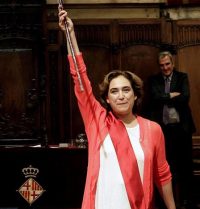In a recent article penned by Masha Gessen in The New Yorker, light is shed over Ada Colau and her being the mayor of Barcelona, Spain. It is an important article too, since even if the movement that brought Colau to power interacted and possibly inspired both Occupy in the west and the Arab Spring in the east, it remains complex and mostly misunderstood. Outsiders are likely to color the fluid situation of Spanish politics with the hue of own ideology. Sadly, repeatedly and mistakenly I hear my fellow Venezuelans identifying whatever happens in the Spanish left as collaborationism with the barbaric Venezuelan government. The ambivalent position that my own party (The European Greens) have regarding both the group that brought Colau to power in Barcelona (a coalition with Podemos as bigger party) and the European dimension of that group (DiEM25) is also frustrating. After all, a political party like the Greens should offer some ideological clarity. Yet even if frustrating, the diversity of internal positions inside the Greens regarding our newer colleagues and sometimes associates, makes lots of sense. At first, both Podemos and DiEM25 seems to articulate what The Greens have tried for a quite long time already, an original search for radical democracy and citizen participation. Yet the populist Podemos also have a very hierarchical internal structure that stifles discussion meanwhile DiEM25 and Colau articulate something that no political party could possibly want, the move beyond political parties.
Here lays the interest of the positions that Colau articulates for Gessen. It begins recognizing that the expected ideological clarity that political parties should offer or does not exists anymore or it has become a problem rather than a solution. Indeed, just like Colau, many of my acquaintances interested in a better world, are interested in coalitions of different ideologies, rather than bringing to power a single one. Our years are not the years of closed ideological gardens, but of fluid alliances. Perhaps more important, Colau articulates how citizens interested in their own cities, its dynamics and it’s government, have come to recognize the need of a European platform of activism.
Regarding this aspect I am -actually- a bit jealous of Colau and of Varoufakis (the most identifiable speaker of DiEM25). When the European Green Party was created, in Rome in 2004, we recognized the necessity of creating a platform for individuals to participate directly in European politics. But we failed in creating it. For years we tried to create European networks of local activists, not only to exchange information, but also to shape European policies. Finally the European Green Party turned the existing network in an online organization to collaborate to campaigns created in Brussels. Very important, but far away from an European green project.
Perhaps those of us that attempted to create cross European political networks from inside a federation of national parties should have recognized early, as apparently Colau and Varoufakis do now, that other kind of mother organization was needed. Yet neither Colau nor the leaders of traditional (or alternative) political parties have had the last laugh, neither the last decree, not yet. Even in Spain, the by-everybody-declared-dead social democrat party PSOE is currently leading the government. And the political share of my Green Party, for sure in this Netherlands were I live, increases. The situation remains fluid. So it is a real pleasure to read about the great surfing of Ada Colau.

